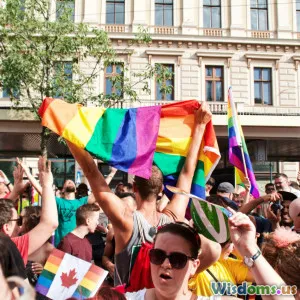
How Coming Out Impacts Romantic LGBTQ Relationships
9 min read Explore how coming out shapes romantic LGBTQ relationships, revealing the challenges and growth it fosters. (0 Reviews)
How Coming Out Impacts Romantic LGBTQ Relationships
Introduction
Coming out is one of the most defining journeys for many LGBTQ individuals. It represents not only an unveiling of identity but also the beginning of new interpersonal dynamics—especially in romantic relationships. Whether one comes out early or late, alone, or alongside a partner, each coming-out experience inevitably shapes the quality and trajectory of romantic partnerships. But how exactly does coming out impact these relationships? Is it more of a challenge or an opportunity for growth? This article seeks to dissect these questions, exploring the nuances of coming out within romantic LGBTQ relationships, supported by real-world insights, research, and narratives.
The Intersection of Identity and Intimacy
The very foundation of a romantic relationship for LGBTQ individuals often hinges on honesty and acceptance—principles intimately tied to the process of coming out.
Coming Out as Self-Acceptance and Communication
Coming out involves self-acceptance first, which is vital as many queer individuals describe internalized fears and societal stigma impacting their self-worth. Psychologist Dr. William P. Yarber notes that “accepting one’s sexual orientation or gender identity is a crucial step toward healthy relationships because it fosters transparency.”
When individuals come out, they practice communication skills necessary to navigate complex emotional landscapes with their partners. For instance, Lisa and Maya, a lesbian couple who recently came out to their families, shared that the act of revealing their true identities deepened their empathy and seriousness about joint life decisions.
Trust Building and the Role of Vulnerability
Coming out necessitates vulnerability. This is often mirrored in romantic relationships where partners gradually share their lived experiences, fears, and hopes. Psychotherapist Juan Ortiz highlights, "Vulnerability in coming out can solidify trust and intimacy if navigated sensitively, allowing couples to build strong emotional foundations."
However, the process can also uncover insecurities. In some couples, one partner’s coming out journey may trigger feelings of jealousy, inadequacy, or inconsistency in sexual identity, requiring ongoing dialogue and compassion.
Social and External Impacts on Relationships
Coming out doesn't happen in a vacuum; social context and external reactions profoundly influence relationship dynamics.
Family Acceptance and Challenges
The reactions from family members can make or break an LGBTQ couple's emotional world. A study published in the Journal of Marriage and Family revealed that 60% of LGBTQ individuals reported changes in familial dynamics post-coming out, ranging from improved closeness to increased tensions.
Consider Jamal and Andre, who experienced hostility from Jamal’s conservative family after his coming out, causing strain and forcing them to create a “chosen family” support network that ultimately strengthened their partnership.
Navigating Public Spaces and Societal Attitudes
Public expressions of affection or simply living openly as a couple pose challenges. Gay couples, for example, often report heightened vigilance in public, fearing harassment.
A 2019 survey by GLAAD found that 34% of LGBTQ respondents experienced discrimination or microaggressions in public, impacting their comfort experiencing everyday intimacy.
Couples learn to maneuver these realities, often discussing safety and visibility strategies—turning coming out into a dynamic shared journey.
Psychological Impacts on Relationship Quality
Anxiety and Minority Stress Effects
Coming out can bring temporary or extended phases of anxiety related to societal rejection or internalized stigma.
According to the Minority Stress Model by Dr. Ilan Meyer, continuous exposure to stigma and discrimination creates chronic stress for LGBTQ individuals. This stress can spill over into relationships, leading to misunderstandings or conflict.
Counseling services tailored toward LGBTQ couples—like those provided by the Human Rights Campaign’s support resources—highlight coping mechanisms emphasizing empathy, resilience, and open communication.
Enhanced Relationship Satisfaction and Intimacy
Research from the Family Equality Council indicates that LGBTQ individuals who are open and supported after coming out report higher levels of relationship satisfaction and emotional closeness than those who conceal their identity.
This enhanced intimacy is because authentic expression and transparency reduce emotional labor and foster deeper connection.
Personal Stories of Growth and Healing
Chloe and Aria’s Journey
After several years of suppressing their queer identities, Chloe and Aria came out together. Chloe recalls, "Coming out felt like a rebirth, but it also exposed us to our families' mixed reactions. Navigating that together brought us incredible strength."
Their story illustrates that shared coming-out experiences can activate solidarity, encourage teamwork in problem-solving, and help reinforce mutual respect.
Ravi and Miguel’s Individual versus Joint Process
Ravi came out before meeting Miguel. Upon entering their relationship, Miguel was still navigating his private journey. As a result, issues emerged around pace and openness.
Miguel reflects, “I felt pressured at first, but with patience and Ravi’s support, I found the courage to share my truth.”
This highlights that within LGBTQ partnerships, partners may often be at different stages of their coming out, requiring flexibility and patience.
Practical Tips for Couples Navigating Coming Out
- Prioritize Open Communication: Create safe spaces for honest discussions about feelings and fears.
- Seek External Support: Engage with LGBTQ+ safe groups or counseling to manage stressors.
- Respect Individual Timelines: Each partner’s pace in coming out can differ—honoring that builds trust.
- Develop Safety Plans: Especially if facing unsupportive environments, having resources and plans protects emotional and physical well-being.
- Celebrate Victories Together: Acknowledge milestones, however small, to reinforce positivity.
Conclusion
The act of coming out affects romantic LGBTQ relationships in profound, multifaceted ways. While it can introduce challenges such as dealing with external prejudice and internal anxieties, it also opens pathways to deeper trust, authenticity, and relational resilience. Understanding that coming out is not a singular event but a continuing process enables couples to navigate the evolving landscapes of identity and intimacy. As research and personal narratives reveal, couples who embrace openness and support each other through coming out often experience enhanced satisfaction and strength, inspiring others to find courage in their own journeys.
In the broader social context, welcoming and affirming attitudes toward queer identities enrich not just individual relationships but the fabric of community as well. In creating spaces of acceptance, marginalized voices can thrive in love and companionship, modeling what true connection looks like: honest, vulnerable, and powerful.
References:
- Meyer, I. H. (2003). Prejudice, social stress, and mental health in lesbian, gay, and bisexual populations: conceptual issues and research evidence. Psychological Bulletin, 129(5), 674–697.
- Journal of Marriage and Family (2020). Family Responses to Coming Out in LGBTQ Individuals.
- GLAAD (2019). LGBTQ Acceptance Survey.
- Human Rights Campaign (2023). Counseling Resources for LGBTQ Couples.
- Family Equality Council (2021). Relationship Satisfaction Among LGBTQ Couples.
Rate the Post
User Reviews
Popular Posts




















